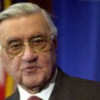Adnan Pachachi

Adnan Pachachi
Adnan al-Pachachi or Adnan Muzahim Ameen al-Pachachiis a veteran Iraqi politician and diplomat. Pachachi was Iraq's Permanent Representative to the United Nations from 1959 to 1965 and foreign minister of Iraq from 1965 to 1967 during the Six-Day War with Israel; he again served as permanent representative to the UN from 1967 to 1969. After 1971, he spent a long period in exile. Since the 2003 invasion of Iraq, Pachachi has been an important figure in Iraqi politics, often described...
NationalityIraqi
ProfessionPolitician
Date of Birth14 May 1923
CountryIraq
The two main issues are security and the necessity for an inclusive election.
We found him tired, haggard, and obviously a spent force,
We found him obviously tired and haggard, unrepentant, even defiant, justifying crimes saying he was a just but firm ruler, our answer was that he was unjust ruler responsible for death of thousands of people.
We were disappointed, naturally, because of the very small, low turnout in many areas, ... It made it impossible for us to be represented on the National Assembly.
It is in our interest to expedite the whole process.
People have to be convinced that these two men are in fact killed and are no longer a threat to the peace of the country,
will hasten the end of the acts of violence that have been perpetuated recently.
We intend to have continued meetings for days and nights.
We have to tell the world there will be no civil war among the Iraqi people. The risk is there.
We have to prove to the world that a civil war is not and will not take place among our people. The danger is still looming and the enemies are ready for us because they do not like to see a united, strong, stable Iraq.
There are other volunteers who take turns, up to 50 of us here.
We are on the verge of taking a major step in our political path.
It's quite possible, also, that the legal proceedings against him may be postponed for a while if he complies with the other conditions. This is what I heard.
The choice of ministers should not be because they are party loyalists or belong to religious groups, but rather because of experience and competency. Iraq needs this.